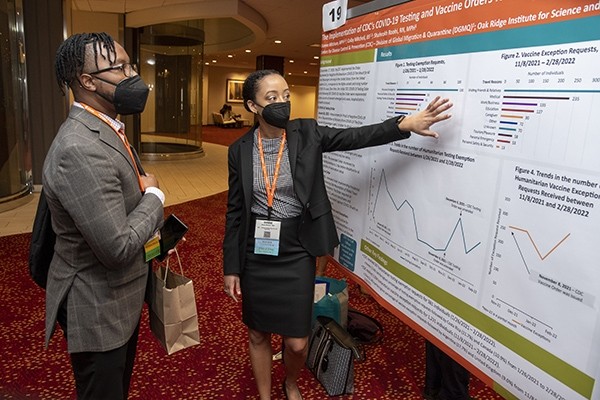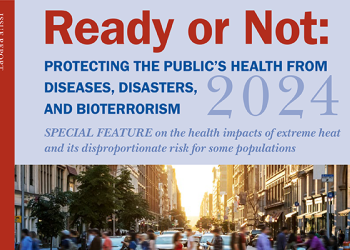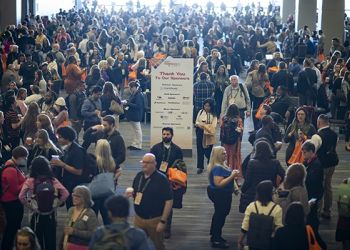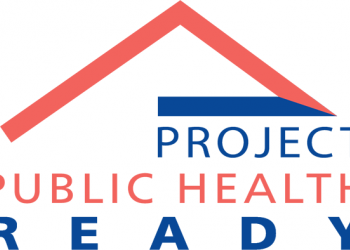A record number of attendees—more than 2,200—gathered in Atlanta and virtually April 4–7 for the 2022 Preparedness Summit. This first in-person Summit since the beginning of the pandemic provided an opportunity to reflect on lessons learned from current and previous responses, and highlighted tools, resources, and learnings that we can apply into the future.
The conference theme, Reimagining Preparedness in the Era of COVID-19, provided a backdrop for a variety of Summit conversations, from plenaries to learning sessions. In-person attendees participated in more than 130 sessions in addition to Ted Talks, plenaries, poster sessions, networking opportunities, and a robust exhibit hall. Many in-person attendees also participated in a scavenger hunt with QR codes dotted throughout the conference venue. Congratulations to scavenger hunt winners Dawn Williams, Pettis County Health Center; Elizabeth Bang, Mississippi State Department of Health; and Lori Musa Mississippi State Department of Health.

In addition to livestreamed sessions throughout the conference, virtual attendees had access to more than 30 on-demand sessions.
To provide attendees with the opportunity to engage in dynamic conversations to inform future planning efforts, development of policies, and refinement of national health security strategy efforts, the Summit hosted eight COVID Listening Sessions exploring such topics as communications, workforce, partnerships, volunteerism, and emergency preparedness and response.
Monday: Transform, Advance, Evolve: Public Health Leadership in the Era of COVID-19
NACCHO Chief Executive Officer Lori Tremmel Freeman, MBA, opened the conference by welcoming attendees to the 15th annual Preparedness Summit. She acknowledged the toll the pandemic has taken on attendees, thanked them for their service, and encouraged them to take advantage of the opportunities to share, learn, and grow in the week ahead.
Next Lynn Paxton, MD, MPH, District Health Director of the Fulton County Health District, welcomed attendees to Atlanta echoing that, “I am thrilled that everyone is here to learn and share ideas so that, next time, we will be better prepared.”
NACCHO Senior Director of Preparedness Laura Biesiadecki, MSPH, welcomed attendees on behalf of the planning committee and called on participants to “speak up” throughout the week, empowering them to share what they have learned throughout the COVID-19 response. She also recognized that 2022 marks the 20th anniversary of two important programs:
- Public Health Emergency Preparedness (PHEP) program, a critical source of funding for state, local, and territorial public health departments that helps to build and strengthen their abilities to effectively respond to a range of public health threats; and
- Medical Reserve Corps (MRC), a network of over 200,000 volunteers who serve as a vital workforce trained and ready to respond during emergencies and in support of ongoing preparedness initiatives.
Throughout the conference, attendees were invited to record a video sharing their reflections on the PHEP and MRC programs. Hear from a few of those contributing messages about the PHEP and MRC programs. Add your voice to the commemorations—record a PHEP or MRC message.
As part of the opening program, the Centers for Disease Control and Prevention’s Center for Preparedness and Response recognized the state, local, and territorial public health preparedness workforce and their contributions to the PHEP program over the past two decades. Learn more about these PHEP Trailblazers, Pathfinders, and Champions.
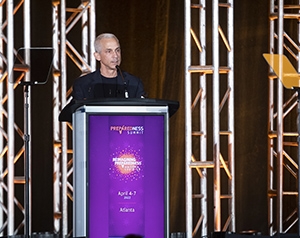
David G. Altman, PhD, Chief Operating Officer of the Center for Creative Leadership, led the conference’s opening session by talking about how to lead from strength, how we can support ourselves and our colleagues in learning and growing from the current crisis, and offering strategies that can be adapted into the future. Altman helped attendees to recognize and acknowledge the stress they have lived under during the pandemic. He provided them with moments to pause and reflect on their experience and invited them to “take a deep breath and be together over the next few days.”
Tuesday: Emerging Stronger After COVID-19: Priorities for Health System Transformation
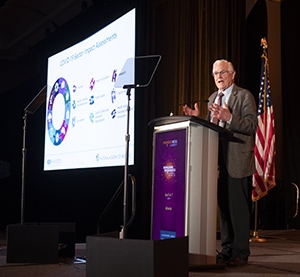
Michael McGinnis, MD, MA, MPP, Leonard D. Schaeffer Executive Officer and Senior Scholar of the National Academy of Medicine (NAM) and Executive Director of the NAM Leadership Consortium, introduced a series of reports undertaken by NAM to understand lessons learned and compelling needs for public health from COVID-19. He recognized the tragic impacts of the pandemic as well as the “glimmers of possibilities—of resilience—that have been seen.”
Karen DeSalvo, MD, Chief Health Officer of Google, reiterated that the report findings are “indicative of the kinds of things we need to do to transform public health.” She thanked the sector’s public health heroes for their work during the pandemic and called on attendees to “lean in” to ensure that public health is at the table as future decisions at all levels are being made.
Reed Tuckson, MD, FACP, Managing Director of Tuckson Health Connections, LLC, discussed the technology advances made over recent years, sharing both the opportunities and challenges they still present. He noted the need for expertise to make sure the public health function excels and called on attendees to “make sure you are part of translating ideas into practice.”
Ayodola Anise, MHS, Deputy Director of the Leadership Consortium at NAM, talked about the need for trust and power sharing and discussed some of the indicators that should be measured to ensure meaningful community engagement.
Thursday: From Pandemic to Endemic: The Future of COVID-19 Response

John Auerbach, MBA, Director of Intergovernmental and Strategic Affairs at the Centers for Disease Control and Prevention, served as moderator for the closing day’s discussion.
Scott J. Becker, MS, Chief Executive Officer to the Association of Public Health Laboratories, noted that “the ability to sustain the work and the infrastructure we’ve built is the job ahead.” He emphasized the need for systems change to ensure the workforce is supported and nurtured going forward, as well as the need for stronger community-based public health advocacy. “Our field is ready for the next generation. We’re tired, but we’re also ready, willing, and able. Take advantage of the funding available now. This is our moment.”
Michael R. Fraser, PhD, CAE, FCPP, Chief Executive Officer of the Association of State and Territorial Health Officials (ASTHO), recognized the enormous mental health toll the pandemic has taken on those in the public health workforce and called out the Public Health, Equity, Resilience, and Opportunity Program (PH-HERO) program ASTHO has launched to address workforce burnout, resiliency, and morale. He pointed out how different all health departments are and called for a better understanding of what it takes to deliver health locally and nationally. Fraser also noted the results of a recent poll on public health as a trusted resource and implored those in attendance to know that, while the response to the epidemic was not perfect, it was successful.
Lori Tremmel Freeman, MBA, Chief Executive Officer, of the National Association of County and City Health Officials, talked about the need for health department staff to make the transition back to the work they love to do every day. She commended the workforce for their resiliency while noting that “we need to get you help; not just with the mental health side of this, but how you do your work and who supports your work.” She noted the need for more communications support as just one area she hopes we learn from, moving forward.
Janet Hamilton, MPH, Executive Director of the Council of State and Territorial Epidemiologists, called for creative thinking to help bring about transformational change and build a pipeline of epidemiologists. She noted a need for better data infrastructure and stressed the critical importance of health equity. Hamilton also called on those in attendance to be advocates and called on them to join their professional organizations to help ensure this important work continues. She encouraged attendees to “think about what each of you individually has contributed. You are the people with the ideals that make this country a better place. I’m honored to be with you.”
Freeman closed by reminding attendees that “we really need you in your roles, now and in the future. We have a lot of work to do to build from this experience. Please don’t give up.”
Conference Content Available On-Demand
In-person and virtual conference attendees have full access to recordings from the plenary and other livestreamed sessions, as well as more than 30 on-demand sessions for 90 days following the conference.
See photos from the 2022 Preparedness Summit.
Save the date for the 2023 Preparedness Conference April 24–27 in Atlanta. For more about the conference, visit www.preparednesssummit.org. Subscribe to the Preparedness Summit e-newsletter to get the latest news on the 2023 Preparedness Summit.
You’re Prepared: Now Let’s Rebuild at NACCHO 360
The 2022 NACCHO 360 Conference will explore how the local public health workforce and its stakeholders can move forward in the midst of an ongoing crisis. The conference will be held as an in-person event in Atlanta as well as virtually, July 19-21.
Looking to the Future: Reshaping the Public Health System empowers attendees by bridging traditional public health practices and disciplines with health informatics, information technology, and surveillance. Early-bird rates are still available; register today to confirm your spot: https://www.nacchoannual.org
